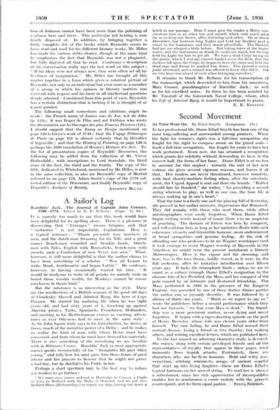Second Movement
As Time Went On. By Ethel Smyth. (Longmana. 15s.)
Ix her professional life, Dame Ethel Smyth has been one of the most long-suffering and unrewarded among pioneers. When the fight for women's rights was a full-time occupation, she -fought for the right to compose music on the grand scale— itself a full-time occupation. Site fought for years to have her work performed. Even now, she has attained a recognition which grants her celebrity without demanding to hear, in the concert hall, the items of her fame. Dame Ethel is at no loss to account for this neglect ; towards the end of her new volume she gives several vigorous reasons? and leaves it at that. Her readers are never threatened, however remotely, with that charity-matinee feeling when, after the entertain- ment, the Urgent Appeal is sent out from the boards. "Rather should fate be thanked," she writes, "for providing a second string whereon to play, as well as one can, the tune life is always making up in one's heart."
That the tune is a lively one and the playing full of dexterity, she proved in her earlier memoirs, Impressions that Remained. They did remain, with those who read them, while other autobiographies were easily forgotten. When Dame Ethel began writing words instead of music there was no suspicion of poaching. The domain of letters was hers by conquest, and will continue hers as long as her narrative floats with such coherence, vivacity andirresistible humour, on an undercurrent of broad sympathies and genuine feeling.. At the risk of offending one who professes to be no Wagner worshipper (and it took courage to resist Wagner worship at Bayreuth in the 'nineties), we might term the present instalment. a literary Master:angers. Here is the vigour and the clowning, and here, too, Is the love theme, boldly stated, as it were, by the full orchestra, after its tentative introduction over fifteen years ago. It lacks the triumphant finale ; unless we are to count as a calmer triumph Dame Ethel's resignation to the obscure fate of her Preislied, the Mass, and her conquest of the pain caused by an intimate and ill-starred friendship. The Mass, performed in 1893 in the presence of the Empress Eugenie, was preceded by one of those festive dinner parties the author can so joyously describe. It was followed. by a silence of thirty-one years. ," Much as we regret to say so," wrote the publishers before a second performance which they had not foreseen, we fear your Mass is dead." , The friend- ship was a more persistent matter, never dying and never forgotten. It began with a tiger-shooting episode on the -part of Henry Brewster, whose wife was eleven years older than himself. The cure failing, he and Dame Ethel nursed their mutual disease, losing a friend or two thereby, but making others, and writing-excellent letters, which are published-here.
To the last named an admiring character study is devoted. She enjoys, along with certain privileged friends and all- the representatives of: royalty that appear -in these pages, total immunity . from -impish ;Meeks. Fortunately, there are characters who are far fret immune. Hold and witty .con- versations, sidelong comments, scraps of ancient scandal that start up into living laughter—thee are Datile Ethers typical fantasia s on her seco3d string. Toread her is 'always a refreshment, since her rich appreciation of ineompairlales enables her- to. synchronise a comic melody with the gravest counterpoint, and do them equal justice. Syr..va














































 Previous page
Previous page